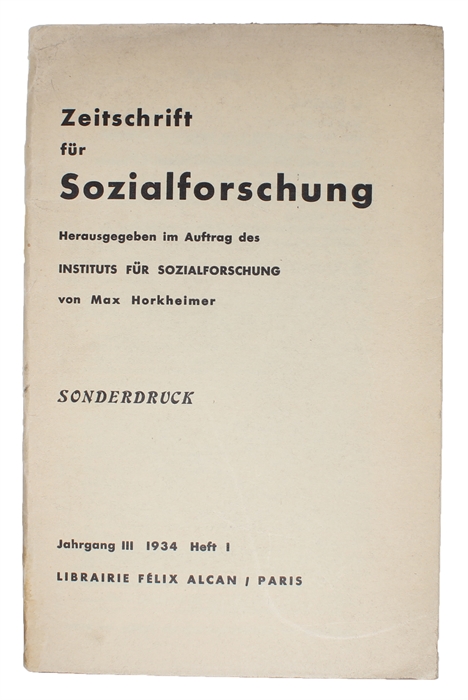OFF-PRINT - INSCRIBED BY THE AUTHOR
HORKHEIMER, MAX.
Zum Rationalismusstreit in der gegenwärtigen Philosophie. [Sonderdruck (aus) Zeitschrift für Sozialforschung. Herausgegeben im Auftrag des Instituts für Sozialforschung. Jahrgang III, 1934, Heft I].
Paris, Félix Alcan, 1934. 8vo. Original stapled wrappers. Minor dust-soiling to wrappers, but otherwise very fine. A stamp: "91. Rue de Lausanne/ Genève" (where Horkheimer and the Institute were in exile) as well as the inscription: "Vom Verfasser überreicht" to p. 1. 53 pp.
Very rare first edition, off-print (from Zeitschrift für Sozialforschung) with presentation-inscription, of Horkheimer's foundational confrontation with the new metaphysics, constituting his most important analysis and critique of scientism and formalistic rationalism.
Horkheimer believed that metaphysics, and especially the proponents of the "Lebensphilosophie" (Dilthey, Bergson, and also Nietzsche) had successfully drawn attention to the shortcomings of a particular type of analytic thought, which he called traditional theory or logic. It is this idea that he later develops further and which constitutes the foundation of the work that he wrote a few years later, which became known as the manifesto of the Institute, "Traditional and Critical Theory" (1937).
Using the reified "ego cogito" to describe what he understands as one of the fundamental characteristics of traditional logic, he here goes on to describe the second important traditional logical assumption that underlies both rationalism and empiricism, namely their unitary, static, and dualistic concept of knowledge. In the present work he maintains that rationalism "presupposes a constant relationship between concept and reality, independent of human praxis" ; among its empiricist critis, Horkheimer continues, these "assumptions of Cartesian philosophy remain untouched" ... "In both philosophical approaches, truth consists in judgments whose concepts are related to individual sense data as the general is to the particular. According to the empiricists, these concepts arise from the sensuous material and are derived by a process of progressive omission of substantive differences - that is, through abstraction. According to the rationalists ... they are fundamental unities inherent in reason ... Knowledge is independent of forces external to or fundamentally different from consciousness. Its relation to the object, its task, the limits of capacity, indeed its most important contents may be determined once and for all." (from the present work, in the English translation, pp. 217-19).
"Max Horkheimer (1895-1973) was a leader of the"Frankfurt School," a group of philosophers and social scientists associated with the "Institut für Sozialforschung" (Institute of Social Research) in Frankfurt am Main. Horkheimer was the director of the Institute and Professor of Social Philosophy at the University of Frankfurt from 1930-1933, and again from 1949-1958. In between those periods he would lead the Institute in exile, primarily in America. As a philosopher he is best known (especially in the Anglophone world), for his work during the 1940s, including "Dialectic of Enlightenment", which was co-authored with Theodor Adorno. While deservedly influential, "Dialectic of Enlightenment" (and other works from that period) should not be separated from the context of Horkheimer's work as a whole. Especially important in this regard are the writings from the 1930s, which were largely responsible for developing the epistemological and methodological orientation of Frankfurt School critical theory. This work both influenced his contemporaries (including Adorno and Herbert Marcuse) and has had an enduring influence on critical theory's later practitioners (including Jürgen Habermas, and the Institute's current director Axel Honneth)." (SEP).
When the Institute for Social Research's directorship became vacant in 1930 after the departure of Karl Grunberg, Horkheimer was elected to the position. In the same year, Horkheimer took over the chair of social philosophy at Frankfurt University. The following year publication of the Institute's "Zeitschrift für Sozialforschung" began, with Horkheimer as its editor. Horkheimer intellectually reoriented the Institute, proposing a programme of collective research aimed at specific social groups (namely the working class) that would highlight the problem of the relationship of history and reason. The Institute aimed to integrate the thought of Marx and Freud. The Frankfurt School attempted this by systematically hitching together the different conceptual structures of historical materialism and psychoanalysis. Horkheimer worked to make the Institute a purely academic enterprise.
Horkheimer's "venia legendi" was revoked by the new Nazi government because of the Marxian nature of the Institute's ideas as well as its prominent Jewish association. The Institute thus closed its location in Germany in 1933. He immigrated to Switzerland, and then to America the following year, where Columbia University agreed to host the Institute in exile and even offered Horkheimer a building for the Institute. For a short period, the organ of the Institute, "Zeitschrift für Sozialforschung" was printed in Paris.
Order-nr.: 48963


![Zum Rationalismusstreit in der gegenwärtigen Philosophie. [Sonderdruck (aus) Zeitschrift für Sozialforschung. Herausgegeben im Auftrag des Instituts für Sozialforschung. Jahrgang III, 1934, Heft I].](/images/product/48963b.jpg)